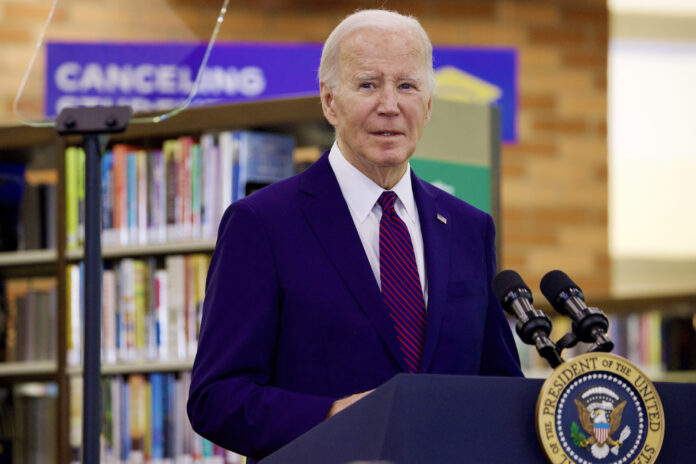President Joe Biden is charging ahead with student loan forgiveness Plan B. On Monday, he provided new details on the plan, which could affect 30 million borrowers. Its notable elements include eliminating up to $20,000 in accumulated unpaid interest and canceling debt for those who entered repayment more than 20 years ago.
Although Biden is trying to fulfill a campaign promise and win the hearts of younger voters prior to this year’s presidential election, he is only wasting our time with this new debt forgiveness plan.
Blanket debt forgiveness fails to address the underlying reasons college is so costly in the first place. Federal subsidies gave universities incentives to increase their tuition, knowing that students could turn to federal student aid to pay for college. As a result, more students attend colleges they can’t afford. The federal government has not put in place any safeguards to ensure students actually benefit from taxpayer-supported loans. Americans continue to lose money as student loans are handed out without consideration for each student’s academic ability or the financial value of the educational programs they attend.
Biden’s plan is a bait-and-switch on taxpayers, who were promised that loans would be repaid to the government in a manner that would, at the very least, make the lending program revenue-neutral. Instead, Biden’s plan effectively transforms some loans into grants by building into the system the expectation that they will not be paid back. Continuing to refer to these subsidies as “loans” is just a semantic game to avoid exposing how costly these changes will be.
The administration also treats interest on student loans as unnecessary by framing it as a “runaway” cost. Yet charging interest is a key way for the government to recover the costs of student lending, whether those costs be the result of inflation, high default rates, or the time cost of money. Without interest, student lending would not even have the possibility of being revenue-neutral.
Irfan Khan / Los Angeles Times/Getty Images
Instead of making another attempt to turn the student lending system insolvent, the Biden administration would be wise to focus on more immediate issues with higher education funding—particularly the issues that they themselves created.
Students across the country have no idea how much financial aid they will receive, thanks to the chaotic roll-out of an updated Free Application for Federal Student Aid (FAFSA) application. College applicants file FAFSA forms to receive financial assistance to attend college. Prospective students usually find out the amount they will receive for each college prior to making a decision. But during this admissions cycle, the Biden administration made many serious errors, such as issuing faulty financial data for hundreds of thousands of students to universities. As a result of these mistakes, universities have pushed their commitment deadlines from May to as far as June.
If the Biden administration struggles to properly release the FAFSA application, how can Americans expect it to effectively fix the student debt crisis?
In the meantime, Biden’s forgiveness plan will likely get held up in the courts and eventually be overturned. It is an unprecedented use of executive authority under the Higher Education Act of 1965. Even though legal experts believe that Biden’s current plan is stronger than his first attempt, they are highly skeptical that it will go through. The Supreme Court has made its position clear on the limits of executive power. And if a Republican administration were to take power, the debt forgiveness plan would most likely be rescinded anyway.
Debt forgiveness is not a real solution to the student debt crisis. The Biden administration needs to move on.
Neetu Arnold is a Research Fellow at the National Association of Scholars and a Young Voices contributor. Follow her on X @neetu_arnold.
The views expressed in this article are the writer’s own.
Uncommon Knowledge
Newsweek is committed to challenging conventional wisdom and finding connections in the search for common ground.
Newsweek is committed to challenging conventional wisdom and finding connections in the search for common ground.


